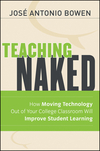
Teaching Naked: How Moving Technology Out of Your College Classroom Will Improve Student Learning by Jose A. Bowen
My rating: 4 of 5 stars
The subtitle of this book actually explains the attention-grabbing title of this book. Bowen contends that the onslaught of technological resources that in the minds of many jeopardize traditional higher education can in fact enhance the basic thing professors and teachers do in the classroom–advance student learning. And the way this occurs is for those who teach to employ all these technologies outside the classroom, including those beloved PowerPoints!
These along with online lectures, podcasts, emails, Facebook posts, tweets and course management systems can be used to promote outside-the-classroom learning so that interactive and action-based learning in the classroom or lab can take the lecture (often described as the transfer of information from the notes of the teacher to the notes of the student without engaging the minds of either!).
All of this is based on the premise that the face to face (naked) interaction between teacher and student is the value added that the brick and mortar institution offers over the virtual classroom. What Bowen tries to do is to maximize the effectiveness of the teacher through sound in class pedagogy through interactive and action-based learning rather than the default lecture. He also argues for teachers as “curators” of technology–guiding students to the best resources and using social media and even gaming outside the classroom to help students with course content, homework and preparation for the in-class experience. He even proposes that courses should be like video games, or even developed AS video games where students only progress to higher levels of knowledge as they master lower levels.
Part 1 of the book explores the new digital landscape. Part 2 gets very practical in the design of courses that are a hybrid of technology and “naked” teaching. Part 3 is perhaps the most thought-provoking as he poses the challenge of what kind of adaptation he thinks needs to take place. He points to the digitization of music and print and how the change in the form and delivery of product radically transformed music and book outlets–for example, the demise of Tower Records and Borders. Yet other brick and mortar outlets like Barnes and Noble have (so far) survived because they shifted to a hybrid model that has both digital and human interaction components–likewise the case with the independent booksellers that have survived. He believes the same will need to happen in higher education in redefining the product, re-thinking the curriculum and how it is delivered and even re-tooling matters of infrastructure and pricing.
The one thing I struggled with in the end is the commoditization of education that I think will inevitably militate against the human values of the naked classroom. While Bowen tries to fuse these, the bottom line at the end of the book seems to be the bottom line. I hope the “hybrid” that Bowen proposes in some form is in fact the direction things take. There is no way to put the genie back in the bottle–it is in fact on every student’s smartphone. Yet I wonder if today’s university has an adequate philosophy of education to resist the siren call of the technology and the pragmatism of the bottom line. Without strong, principled, and savvy leadership, I wouldn’t be surprised if technological and market forces decide these questions in the next decade or two. That’s just how fast things are moving.
Thank-you to Bob for sharing Review: Teaching Naked: How Moving Technology Out of Your College Classroom Will Improve Student Learning from his blog Bob on Books (11/15/2013).
While researching Teaching Naked, I enjoyed watching Teaching Naked: Dr. Jose Bowen at TEDxLSU (17 min, 18 sec) and a short interview (4 min, 24 sec). I found this material helpful in understanding what Jose A. Bowen brings to the table as he passionately advocates higher ed’s calling to “change the way people think” through MBCs (i.e., Massively Better Classrooms). I very much look forward to following how Jose A. Bowen works out his ideas at Goucher College, where he began serving as the 11th President on July 1. ~ Thomas B. Grosh IV, Associate Director, Emerging Scholars Network
Bob Trube is Associate Director of Faculty Ministry and Director of the Emerging Scholars Network. He blogs on books regularly at bobonbooks.com. He resides in Columbus, Ohio, with Marilyn and enjoys reading, gardening, choral singing, and plein air painting.

Technology is also moving very quickly through the K-12 educational program. It is no wonder that universities and colleges have to integrate technology into their programs as well. Students will come to them with advanced skills and colleges need to be ready. As a public school teacher, we are facing the same issues that Bowen mentions in his book.
Annice, you make a great point for why university professors must engage these changes.